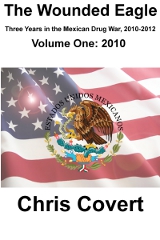Rights Groups Demand Apology from Mexican Admiral

2011-07-28
Posted by: badanov
By Chris Covert
Human rights groups are demanding an apology from Mexican Secretaria de Marina (SEMAR) Admiral Mariano Francisco Saynez Mendoza for his remarks delivered at a commencement ceremony at Mexico's naval academy Tuesday.
To read the Rantburg report on Admiral Saynez Mendoza's speech, click here
Dario Ramirez with the Article 19 human rights organization said the remarks have sent him and others "reeling".
APRO news service reported an umbrella group of human rights groups including Amnesty International have cancelled talks with the Mexican federal government over implementation of a new human rights protocol signed by president Felipe Calderon Hinojosa July 5th.
Admiral Saynez Mendoza spoke Tuesday at the graduation ceremony at Mexico's primary naval academy, Heroica Escuela Naval Miltar naval academy in Veracruz, Veracruz. Calderon Hinojosa and head of the Mexican Army, Gneral Guillermo Galvan Galvan (SEDENA) were also in attendance, and heard the admiral's speech.
Admiral Saynez Mendoza said that drug cartels use citizen groups to discredit armed forces using human rights as a means hiding their real intentions. The admiral did not elaborate on any specifics in his speech.
The admiral also said in his remarks that "...before the ruthlessness and irrationality of criminals, it is the obligation of the State to fully respect human rights, since the state cannot be required to break the law to enforce it."
He also said that the Mexican Navy will not "tolerate violations of human rights (within the ranks) either by error or lack of professionalism."
Admiral Saynez Mendoza's speech reflects a growing frustration the Mexican military has expressed over its role in the fight against organized crime. Even though at least 90 percent of all violent deaths are at the hands of the drug cartels in Mexico, human rights groups have focussed solely on the few cases of human right abuses committed by the military as a point of criticism of the military's role in Mexico's war on drugs.
The ruling by the Mexican Supreme court last July 12th which said that human rights cases brought before civilian courts may charge soldiers and sailors with human rights abuses despite the fact that the military investigates and disposes of hundreds of cases yearly in open forums in the own system.
SEDENA's human rights directorate recently released figures stating that 98 percent of all human rights cases investigated by SEDENA are dismissed as bogus. One unidentified field commander was quoted as saying most of the cases brought are "jokes."
The court ruling has cast a dark pall on the Mexican military community as it attempts to come to grips with the implication of the broad mandate given civilian courts in cases involving military personnel.
Red de Organismos Civiles Todos los Derechos (Network of Civil Organizations for All Rights ), represented by Agnieszka Racynska, said in the APRO report that talks with the Ministry of the Interior (SEGOB) would be suspended because of the "lack of respectful dialogue".
Racynska was quoted as saying, "...we are not disposed to continue conversations, if the prior remarks by Secretaria Saenza are not retracted, because with those declarations, we put the (human rights) defenders in a situation of uncertainty, risk and high vulnerability."
Both Admiral Saynez Mendoza and Racynska may have a point.
In his remarks Tuesday, Saynez Mendoza clearly used the word local in describing civiten's groups. One of the hallmarks of NGOs with local chapters is that they usually do an abysmal job of identifying who is in their ranks. A cartel agent could easily be a part of a local group monitoring humans rights abuses by the military, and unless the local group vets its members, there is no way to find out for sure.
On the other hand, once cartels find out which group is in thrall to which cartel, a rival group is extremely likely to deal with the newly discovered situation violently.
Human rights groups in discussions with SEGOB were seeking to establish protocol with Mexican security forces in including the army and marines for the protection of "human rights defenders." The document Calderon signed July 5th was a recommendation by international human rights organization to establish a protocol among SEGOB, Administración Publica Federal, Procuraduria General de la Republica (PGR).
Racynska said talks would not resume unless Admiral Saynez Mendoza issued an apology.
Groups said to demand an apology include Amnesty International, Centro de Derechos Humanos de la Montaña Tlachinollan, Articulo 19, Comision Mexicana de Defensa y Promocion de los Derechos Humanos (CMDPDH), Litiga Olé, Centro Nacional de Comunicacion Social (CENCOS)and Servicios y Asesoría para la Paz (SEREPAZ).
Most of those groups have strong ties to international and American socialist groups including the Open Society Institute and CODEPINK.
Thursday at the Chapultepec castle in Mexico City, legislators and representatives of the Mexican Movement for Peace with Justice and Dignity, and poet and leftists poet Javier Sicilia are to meet to discuss security issues in some remote areas of Mexico.



